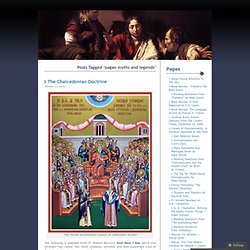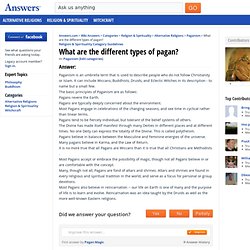

Dispelling Myths About Wicca and Paganism. There are many misconceptions out there about Pagans and Paganism as well as Wicca and Wiccans.

For some reason all of these words have negative connotations for many and are often associated with evil, particularly by Christians and Christianity. People do not seem to understand what it means to be Wiccan or Pagan. Perhaps by dispelling the myths we can begin to build tolerance and peace between faiths. Wicca is the same thing as Paganism.
It is the same to be Pagan as it is to be Wiccan. Pagan myths and legends « Paying Attention To The Sky. The Fourth Ecumenical Council of Chalcedon 451AD The following is adapted from Fr.

Robert Barron’s And Now I See which one reviewer has called “the most readable, sensible and well-supported view of Christianity” he had ever read. It constantly surprises me that as I return to this book to help me advocate the Church’s positions, I always find something clear-cut and easily understandable. Most recently I was in an Internet food fight on the historicity of Jesus.
The Jesus Denier was going on and on about how Jesus was in fact a fable constructed from earlier pagan myths. Anyways, here is the amalgam of arguments I used in a longer more thoughtful piece. THE HISTORY OF PAGANISM. The history of Paganism began in about 10,000 BC, during the Paleolithic Age. It was a time when primitive people were nomadic, and had to hunt for their food, having to follow the herds of animals to survive. Religion: Paganism. Pagan Origins, Pagan History, Pagan Beliefs. POCM Pagan Origins of the Christ Myth. The Prophet Ezekiel. Who was the prophet Ezekiel?

Ezekiel was God's chosen man and messenger. Ezekiel proclaimed the Words of God to the children of God, the Israelites. Ezekiel was both a prophet and a priest. Ezekiel went into exile with the Israelites as decreed by King Nebuchadnezzar to the city of Babylon. Historians and scholars agree that Ezekiel was a highly intelligent man. Ezekiel denotes a couple different meanings - God is strong, God strengthens or God makes hard. Ezekiel for the most part did his priestly duties to the best of his abilities. Ezekiel was also a married man. What are the different types of pagan. Paganism is an umbrella term that is used to describe people who do not follow Christianity or Islam.

It can include Wiccans, Buddhists, Druids, and Eclectic Witches in its description - to name but a small few. The basic principles of Paganism are as follows: Pagans revere the Earth. Pagans are typically deeply concerned about the environment. Most Pagans engage in celebrations of the changing seasons, and see time in cyclical rather than linear terms. Pagans tend to be fiercely individual, but tolerant of the belief systems of others.
The Divine has made Itself manifest through many Deities in different places and at different times. Is it true what they say about Hell? : Pagan Hell. Pagan Hell One of the key assertions of most groups which claim the label "Christian" is that they get their religious beliefs from one source, and one source only--the writings collected into the Old and New Testaments of the Bible.

It should thus be startling to Christians to find that most of the extensive details about the nature of Hell promoted in the "standard" Roman Catholic and Protestant descriptions and popular perceptions of Hell have been based for almost 700 years not on information found in that collection of writings. They grow, instead, out of one alternate source in particular, fourteenth century Italian poet Dante Alighieri's poem L'Inferno. And most of the content of that poem itself is not based even loosely on any information from the Bible ... but from a mish-mash of Jewish fables, pagan mythology, and medieval superstitions. For details on the non-biblical Jewish sources Dante tapped into, see the articles The Jewish View of Hell and Jewish Fables. 3.
Paganism 101. {*style:<u><b> Paganism 101 Some Qs and As </b></u>*} {*style:<b> </b>*} Historically, Christians have called most people who believed in more than one god, or in any God other than the Christian/Jewish/Muslim Yahweh by the term "pagan.

" There are many pagan spiritual paths. They think of Deity as both male and female, not just as "He. " Their religion is based largely on ancient religions that predate Christianity, especially the spirituality of the ancient Celts, Romans, Greeks, Norse, and Egyptians. Many pagans use magic (more about that below). Some pagans describe their faith as being much like Native American traditional beliefs, since many Americans are familiar with that idea. Nope. No again. Many people get confused, though, because some Pagans use the term "Witch" to describe themselves, and they think of that as someone who worships Satan---an accusation left over from the days of the Witch Trials.
Many Pagans wear a star in a circle. Wiccans tend to call themselves "Witches. " Witchcraft, Wiccan and Pagan Index.